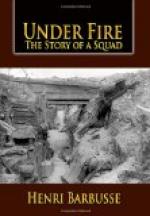Cleansed from the passions of party and faction, liberated from prejudice and infatuation and the tyranny of tradition, these watchers on the threshold of another world are vaguely conscious of the simplicity of the present and the yawning possibilities of the future.
The man at the end of the rank cries, “I can see crawling things down there”—“Yes, as though they were alive”—“Some sort of plant, perhaps”—“Some kind of men”—
And there amid the baleful glimmers of the storm, below the dark disorder of the clouds that extend and unfurl over the earth like evil spirits, they seem to see a great livid plain unrolled, which to their seeing is made of mud and water, while figures appear and fast fix themselves to the surface of it, all blinded and borne down with filth, like the dreadful castaways of shipwreck. And it seems to them that these are soldiers.
The streaming plain, seamed and seared with long parallel canals and scooped into water-holes, is an immensity, and these castaways who strive to exhume themselves from it are legion. But the thirty million slaves, hurled upon one another in the mud of war by guilt and error, uplift their human faces and reveal at last a bourgeoning Will. The future is in the hands of these slaves, and it is clearly certain that the alliance to be cemented some day by those whose number and whose misery alike are infinite will transform the old world.
2
In the Earth
The great pale sky is alive with thunderclaps. Each detonation reveals together a shaft of red falling fire in what is left of the night, and a column of smoke in what has dawned of the day. Up there—so high and so far that they are heard unseen—a flight of dreadful birds goes circling up with strong and palpitating cries to look down upon the earth.
The earth! It is a vast and water-logged desert that begins to take shape under the long-drawn desolation of daybreak. There are pools and gullies where the bitter breath of earliest morning nips the water and sets it a-shiver; tracks traced by the troops and the convoys of the night in these barren fields, the lines of ruts that glisten in the weak light like steel rails, mud-masses with broken stakes protruding from them, ruined trestles, and bushes of wire in tangled coils. With its slime-beds and puddles, the plain might be an endless gray sheet that floats on the sea and has here and there gone under. Though no rain is falling, all is drenched, oozing, washed out and drowned, and even the wan light seems to flow.
Now you can make out a network of long ditches where the lave of the night still lingers. It is the trench. It is carpeted at bottom with a layer of slime that liberates the foot at each step with a sticky sound; and by each dug-out it smells of the night’s excretions. The holes themselves, as you stoop to peer in, are foul of breath.
I see shadows coming from these sidelong pits and moving about, huge and misshapen lumps, bear-like, that flounder and growl. They are “us.” We are muffled like Eskimos. Fleeces and blankets and sacking wrap us up, weigh us down, magnify us strangely. Some stretch themselves, yawning profoundly. Faces appear, ruddy or leaden, dirt-disfigured, pierced by the little lamps of dull and heavy-lidded eyes, matted with uncut beards and foul with forgotten hair.




